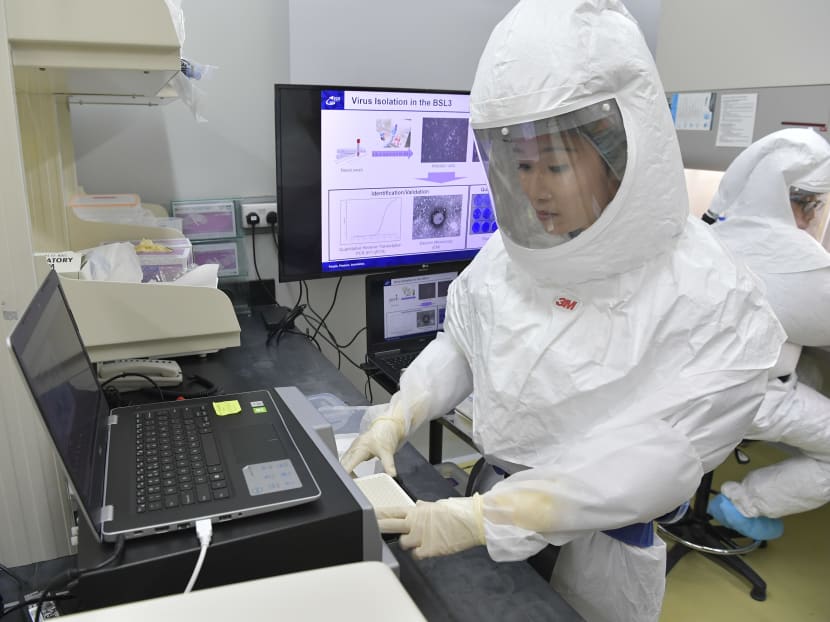S$90m upgrade for DSO biosafety lab to deal with threats worse than Covid-19: Ng Eng Hen
SINGAPORE — Singapore is upgrading the facilities at the DSO National Laboratories to the highest possible biosafety level, BSL-4, to deal with biological threats graver than Covid-19, Defence Minister Ng Eng Hen said in Parliament on Monday (Mar 1).

A scientist wearing personal protective equipment with powered air purifying respirator places samples into the polymerase chain reaction machine in the existing DSO biosafety lab.
- Singapore has labs which were assessed to provide adequate protection before Covid-19, but upgraded labs will provide higher protection
- These include more stringent levels of air separation and the ability to quickly shut down and isolate that facility when needed
- The Defence Minister noted that steady defence spending over the years helped Singapore better handle the Covid-19 pandemic
SINGAPORE — Singapore is upgrading the facilities at the DSO National Laboratories to the highest possible biosafety level, BSL-4, to deal with biological threats graver than Covid-19, Defence Minister Ng Eng Hen said in Parliament on Monday (Mar 1).
The Ministry of Defence will be investing S$90 million into the joint effort by DSO, Singapore’s largest defence research and development organisation, and the Ministry of Health (MOH), he said.
In a speech during the debate on his ministry’s budget, in which he outlined Singapore’s strategy to prepare for the security environment of a post-Covid world, Dr Ng said one of the epiphanies gained from the pandemic is that Singapore must continue to plan long-term and steadily invest in emerging and novel capabilities.
“Nowhere has this wisdom been more vindicated than in Mindef's and SAF’s (Singapore Armed Forces) ability to respond to Covid-19,” he added.
Thanks to steady defence spending over the years, DSO managed to get polymerase chain reaction tests up and running in January 2020, within the same month that Covid-19 entered Singapore.
And through the waves of infections last year, and despite ongoing SAF operations, only a small number of Covid-19 cases arose within the SAF, which were detected, contained effectively, with no clusters formed, Dr Ng noted.
“Members would agree with me that those investments from our defence budget that went into building medical and scientific capabilities have paid for themselves many times over,” he said.
“Had we not learnt the right lessons following Sars (severe acute respiratory syndrome), sarin, anthrax, and other lethal chemical and biological incidents over the years, DSO would not have had the facilities, let alone the people and expertise to produce tests and other breakthroughs, when Covid-19 invaded our shores.”
Today, many developed countries — including China, Japan and Korea — have already built BSL-4 labs, but there are none among Asean nations, Dr Ng said.
While Singapore has BSL-3 labs, which were assessed to provide adequate protection before the Covid-19 pandemic, BSL-4 labs will provide higher protection, such as more stringent levels of air separation and the ability to quickly shut down and isolate that facility when needed.
Third-party and overseas experts will also be brought in to advise on the entire process, from the design stage to construction, and to periodically validate the systems thereafter, he said.
Dr Ng noted that Covid-19 could have been “much worse” as an infectious agent.
For instance, diseases like mumps and measles are four to 10 times more infectious than Covid-19, and Sars and the Middle East Respiratory Syndrome cause more severe cases and deaths.
“Can we plan on the basis that future pandemics or biological attacks will not be worse than Covid-19? Or can we ‘outsource’ to or call another country for help when it happens? I think members of this house can unanimously say, surely not,” he said.
“It would be foolish to depend on others and we need to build capabilities within Singapore to protect ourselves.”
The upgrading works on the DSO facilities at Marina Hill are expected to be completed by the end of 2025.
Mindef added in a statement that the laboratory will be used to isolate and culture new emerging infectious disease pathogens and known high-risk pathogens. The cultures can be immediately used for the development and testing of diagnostics and developing countermeasures such as antibody therapeutics.
The biosafety measures in the enclosed facility will include:
- Heat sterilisation of all solid wastes before incineration
- Multiple air locks and negative pressure in the laboratory to ensure directional air flow
- An air corridor around the laboratory as a safety barrier
- Safe shutdown capabilities to maintain neutral pressure with no air movement out of laboratory in the event of mechanical failure
A qualified consultant will be engaged to assist in the design of the laboratory to ensure it adheres to international standards and guidelines from the World Health Organisation and the United States Centre for Disease Control and Prevention, Mindef added.
The upgraded laboratory will aso comply with the Ministry of Health’s National Biosafety Standards for Maximum Containment Facilities.











